Pledges are being made that Brits with property in Spain will face no disruption once the UK leaves the EU, but how true is this?
Thursday, November 30, 2017
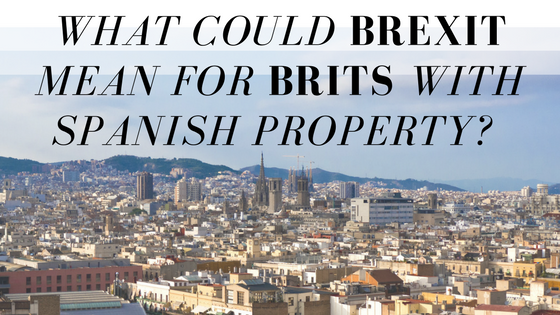
You can’t deny it, Brexit has caused a significant amount of turmoil, confusion, and worry for the people of Britain. Whether it be fears over immigration or trading between countries, the decision to leave the European Union has sparked fear and worry amongst millions.
It’s also led to a significant amount of speculation and doubt amongst those who own Spanish property. Many people are asking the questions, “just how much will the vote to leave the EU effect me, my house and my prospects regarding continuing to live abroad?”
Despite this, statements have recently been made by officials in Spain to say that brits with properties in the country needn’t worry. But just how much can we trust this?
What are pledges being made?
The Spanish Foreign Minister Alfonso Dastis has spoken up in an attempt to reassure Brits with Spanish property. He stresses things will remain largely the same once Brexit takes effect. He made a statement saying that homeowners would face “no disruption”. This is largely down to a desire to continue to nurture the countries close relationship with the UK in terms of economic and social exchanges.
What is the current situation with Brits looking to move to Spain?
Spain is still the most popular choice for Brits looking for a summer holiday getaway to a sunny European country. Recent figures have revealed that the country accounts for the largest number of British citizens living abroad in the EU, at just under 390,000. Brits endeavour to purchase at different times. Some placing a Spanish property purchase on their long-term retirement plan. On the other hand, couples and families with children seek holiday homes they can use throughout the year.
What could Brexit mean for Brits with Spanish property?
There is a lot of speculation that member states who are angered by Brexit, will put pressure on British expats to leave. Luckily those with Spanish property are protected by the EU’s right of free movement. This means that EU members are unable to bar or expel citizens of other EU states.
There are also concerns that Brits abroad may be barred from taking advantage of healthcare and other benefits, but this may not materialise, especially given the fact that the UK plays host to as many as three million EU nationals.
Whether the outcome of Brexit is good or bad for those who own European property. It’s important that everyone remains vigilant and stays prepared as Brexit continues to unfold.
 0
Like
Published at 1:12 PM Comments (2)
0
Like
Published at 1:12 PM Comments (2)
Is now a good time to buy abroad? If so, where?
Thursday, November 16, 2017

When it comes to both selling and buying a property abroad, timing is everything.
With market fluctuations occurring and things constantly changing, you need to make sure you’re snapping up a property at the optimum time in order to ensure a good return on investment and to avoid losing out on hefty sums of money. Brits are still seeking solace in European holiday homes, but is now a good time to buy and if so, where? Check out our blog on some of the best and worst places to look if you’re wanting to buy abroad.
Spain
After a decade of uncertainty, Spain is still the most popular choice for Brits buying a property abroad. The volume of sales has been increasing quarter on quarter and there is a lot of confidence being recovered in the market. Properties remain affordable and are a lot cheaper than some of the neighbouring countries that Brits are flocking to, so it’s a good choice if you don’t have loads of money to splash out with.
Bulgaria
If you are really looking to budget when it comes to buying a property abroad, Bulgaria is the best option for you. With its amazing scenery, beaches and mountains, it’s a great choice in terms of location and is also extremely affordable when it comes to the cost of living and of buying property. The average property price is £90,734, while utility bills will only set you back on average £70 a month. With interest increasing in the country, now may also be a good time to buy and sell as you may stand to make money.
France
France has always been another popular choice for Britons interested in buying a property abroad, with the French Riviera being a particular pull to the region. The newly-appointed French President is committed to reducing taxes for property owners and simplifying the fiscal framework, all strong pulls for anyone about to invest in a home in France.
Generally, how are things looking when it comes to buying a property abroad?
While many markets are continuing to show signs of recovery, there is still a lot of uncertainty, especially given the fact that many of us don’t know what impact Brexit will have.
 0
Like
Published at 11:45 AM Comments (0)
0
Like
Published at 11:45 AM Comments (0)
What does the ‘weak pound’ mean for you and your property?
Thursday, November 9, 2017
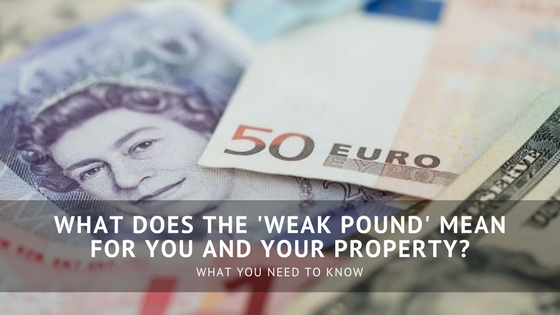
What does the ‘weak pound’ mean for you and your property?
While the thought of owning a property in a sunny European country like Spain does sound extremely appealing, what doesn’t sound so great is the cost implications that go along with it.
If you pay any attention to currency rates you’ll probably have noticed that the cost of exchanging sterling for euros is seemingly higher as of late.
The pound has just entered an 11-month low at 1.11 euro and financial forecasters predict things could dip even further.
What does this mean for people who own property abroad?
Political uncertainty
One of the key factors contributing to the weak pound is of course Brexit. Ever since the UK voted to leave the European Union last June, the pound has been buying fewer euros.
This isn’t the only political element that is affecting the weakness of the pound, or, perhaps more accurately, the strength of the euro.
The French presidential election that took place earlier this year also produced a lot of political uncertainty, driving the euro lower.
However once, it became clear that Emmanuel Macron was likely to win, these concerns were forgotten, leaving the euro in a much stronger position.
Brexit has left us all feeling the pinch and facing financial uncertainty, especially for those who own property abroad as repaying mortgages could prove to be more difficult.
Strengthening euro
It’s important to understand that any event that takes place and makes the euro seem more attractive will have a direct, negative impact on the pound.
The euro has been boosted recently due to the market anticipation that the European Central Bank will start cutting back on its Quantitative Easing programme.
This has resulted in more euros in the Eurozone economy, which in turn has boosted performance. However, if the programme changes, pressure on the euro will lift which will change the game once again and could lead to the pound gaining back some of its lost ground.
Keeping interest rates low
In terms of investment, low-interest rates are usually seen as a negative as they deter foreign investors and make currency seem less attractive.
Many economic observers predicted that the Bank of England Monetary Policy Committee meeting last month would see action in favour of raising interest rates. This wasn’t the case, so a low-interest rate persists and the pound continues to decrease in value. Whether this changes as the political picture becomes clearer remains to be seen but, for the short term at least you’ll likely notice an increase in cost when buying or travelling overseas.
With interest rates across Europe rising, owning property could become more expensive.
 0
Like
Published at 11:32 AM Comments (0)
0
Like
Published at 11:32 AM Comments (0)
Repossession: everything you need to know
Thursday, November 9, 2017
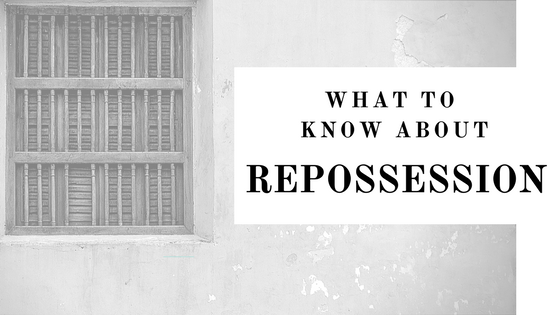
The word repossession incites doom and a feeling of dread in all of us, particularly when we are talking about property that we own abroad.
You’ve spent time-saving and planning for your home purchase abroad, created amazing memories here with your family, only to be left in a situation where unfortunate events or poor finances have resulted in repossession.
So, what does repossession actually mean and what course of action should you take if you find yourself in a position where your holiday home is going to be repossessed?
What is repossession?
If you purchase a house using a mortgage, you will technically own the property but your mortgage lender will have a financial claim against it. If, for whatever reason, you are unable to make all of the payments your lender will attempt to get the money back from you, along with any other missed interest payments and fees. One of the ways that they may choose to do this will be through repossession of your property. The courts will have to decide that this is an appropriate course of action and will also decide whether bailiffs will be sent to evict you. Once a lender has taken control of your home, they will sell the property and recover all of the money that you owe, as well as additional costs that have built up.
Is the situation any different or worse with property abroad?
If you buy a property abroad and are subsequently required to borrow money abroad, lenders will be able to follow you home to the UK and take action against you through the UK courts.
What’s the worst case scenario?
Unfortunately, repossession can lead to bankruptcy in very bad circumstances. Foreign lenders have the right to follow you back home, which means moving back won’t always means you aren’t chased for outstanding payments.
What’s the best course of action?
There are a number of things you can do if you find yourself in a position where your home is going to be repossessed. Handing back the keys to the property and surrendering yourself is one course of action, but should only be taken in serious circumstances with proper advice and guidance to avoid bankruptcy.
 0
Like
Published at 11:25 AM Comments (1)
0
Like
Published at 11:25 AM Comments (1)
After the debt crisis and Brexit, is it too much trouble to lend to Brits who want to buy abroad?
Friday, November 3, 2017
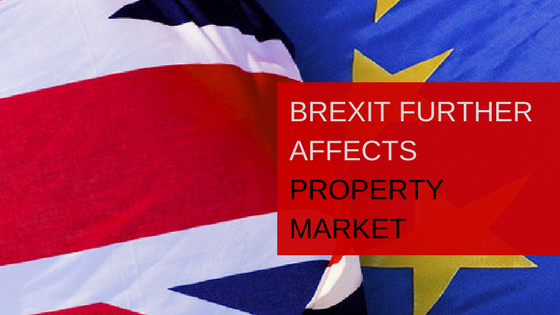
Brexit has further affected those looking to purchase a property outside of the UK.
Prior to the property bubble burst in 2007, Britons eager to snap up a home in the sun on the continent were given access to a huge range of mortgages. But over the last decade, the market has changed more than a little. Today, the debt crisis and the Brexit vote have made it more challenging to secure the finance you need to put your name on a stunning second home, whether it’s on the beautiful coast of Spain or in an authentic village in Greece.
The first factor to hit the lending market for Brits seeking to buy abroad was the debt crisis. In 2007, property prices were on the rise and developments were springing up across Europe in the most popular spots. But the financial crisis led to prices plummeting, planned construction work being halted, and left families unable to make their repayments. It meant that banks have become more cautious and risk-averse, making it more difficult to find a willing lender and in the wake of the crisis the number of Brits buying homes in Spain halved.
Uncertainty and the weakening pound means you’ll get less for your money, with prices rising by about 10% since the referendum. If you thought your budget would be stretched before Brexit, you’re going to face further pressure now and it could get worse when you consider currency fluctuations.
Coupled with the risk-averse attitude of the banks, the impact of Brexit is affecting Brits seeking to lend to buy abroad.
The good news is that there are still options for Brits looking to buy that dream holiday home and it can still be a worthwhile investment option if you pick out the right property. Whether you’re choosing to buy a property to turn into a family home or to rent out on the market, there are still lenders that are open to you.
 0
Like
Published at 10:50 AM Comments (1)
0
Like
Published at 10:50 AM Comments (1)
Own a house abroad? What is a property bubble?
Friday, November 3, 2017
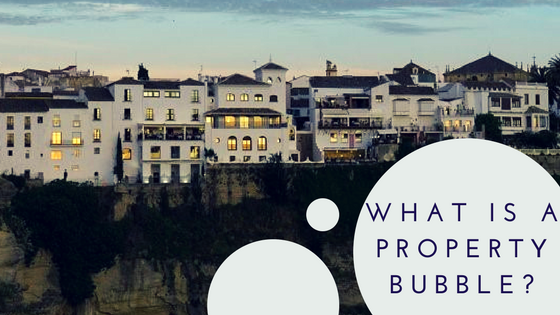
What is a property bubble and how could it affect you if you own a house abroad?
At present, the housing market across Europe is unstable and changeable. Prices in some European countries such as Ireland, Lithuania, and the Czech Republic are steadily rising, prompting fears that another property bubble could occur. You may have seen the phrase property bubble being splashed across different articles and headlines, but do you actually know what it means and how it may affect you if you own a house abroad?
Keep reading to find out exactly what a property bubble is and the implications of one setting in.
A property bubble is an increase in housing prices which is prompted by higher demand in the face of limited supply, which can take a long time to readjust and increase.
Speculators will enter the market in order to trade during a time of higher risk, hoping to capitalise on higher profit margins. This will further drive demand, which will at some point decrease as supplies simultaneously increase. This results in a sharp drop in prices, and the bubble bursts.
How will a property bubble affect you?
If you own property in a country within the EU that is in a property bubble, this could be interpreted as being a good thing. An increase in demand and prices may mean that, if you are looking to sell your property, you will be able to do so more easily and will benefit from a higher return.
However, it is important to remain vigilant regarding property bubbles, as once they burst prices will drop significantly, which could leave you in a situation where you receive less money than you hoped for your property. You may even be left in negative equity.
The Spanish property bubble
The property bubble in Spain burst in 2008, before which the country had been building more homes than the UK, Germany, and France combined.
Brits also forked out millions for holiday homes that were never built, but luckily many will be getting this money back as Spain’s Supreme Court opened the way for around 130,000 Britons to claim directly from banks.
If you have any questions about property bubbles or are concerned about selling your property abroad, get in touch with us and one of our friendly and highly-qualified staff will be happy to offer you assistance.
 0
Like
Published at 10:04 AM Comments (1)
0
Like
Published at 10:04 AM Comments (1)
What happens if you find yourself in a situation where your overseas property developer has gone bust?
Friday, November 3, 2017

Often when you buy a property abroad, it will be a through a property developer, especially if you’re buying off plan.
If the market is unstable and values and demands are reducing, situations can arise where your property developer happens to go bust. We saw this in Spain a few years ago with many urbanizations left half finished. So, where does this leave you if your developer goes bankrupt or ceases trades while you’re in the middle of buying one of their properties?
What happens if you have completed your purchase on a property?
If the sale has gone through, it is likely that the developer will have also sold other properties within the same complex. In this situation, the developer becomes your neighbor and is subsequently responsible for his fair share of the community fees.
However, because many developers now operate under the Administrative Receivership, it will be necessary for you to deal directly with the office of the Administrative Receiver and not with the developer themselves.
It may, therefore, be necessary to call a meeting with other members of the development community in order to protect your position regarding unpaid community fees. Once an agreement has been reached, the community will be able to enforce the unpaid fees as a debt against any incoming purchaser and then collect the unpaid balance.
What if you haven’t completed your purchase on a property?
If you haven’t completed your purchase but have perhaps paid your deposit or signed your Private Purchase Contract (PPC), it is likely that you will be in a situation where you will be purchasing the property outright once completion has been met. Legally speaking, there are two different types of creditors; secured and unsecured. The former will have registered charges against the development company’s assets by way of mortgages or other loans, whereas the latter will not.
Unfortunately, until a property is completed, a prospective purchaser who hs paid a deposit but not the amount of the property in full will be classified as an ‘unsecured’ creditor. This means that your rights to recoup the cash that you deposited with the development will come second to funds owed to ‘secured’ creditors.
 0
Like
Published at 10:00 AM Comments (0)
0
Like
Published at 10:00 AM Comments (0)
Spam post or Abuse? Please let us know
|
|